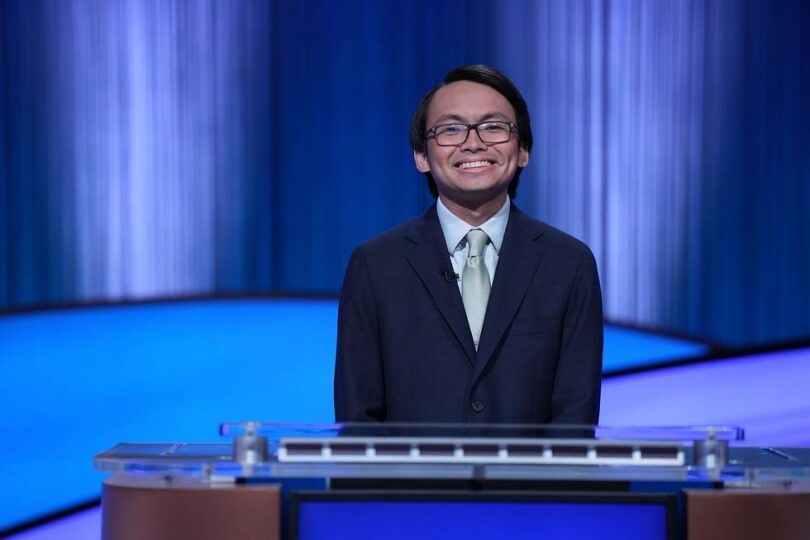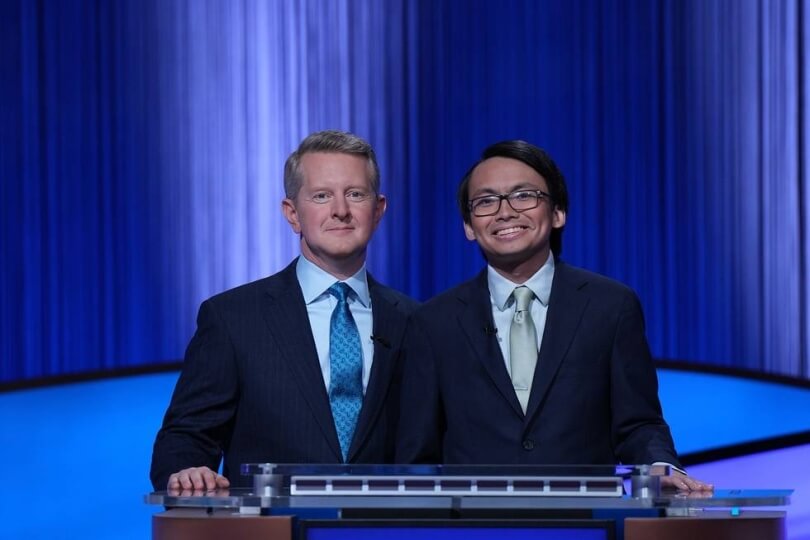Paolo Pasco, A.B. '22, on the set of "Jeopardy!"
Paolo Pasco missing a crossword puzzle answer? Inconceivable! Pasco, A.B. ‘22, has been constructing crossword puzzles since long before he was a computer science concentrator at the Harvard John A. Paulson School of Engineering and Applied Sciences (SEAS), with puzzles published in the The Atlantic, The New York Times, Los Angeles Times, Wall Street Journal and USA Today. Not being able to solve a crossword clue in a big competition just didn’t sit right.
“I didn't know two geography things when they crossed,” he said. “I thought I should get better at trivia.”
To learn more trivia, Pasco began spending more time on trivia websites. He also started watching “Jeopardy!” again. It wasn’t long before watching the famous trivia game show transformed into wanting to be on the famous trivia game show. After taking the test multiple times, he finally passed and was invited to compete.
“I had taken the test several times in college,” he said. “I think the first time was probably during the pandemic, like 2021 or so. I took the test in ‘23, nothing happened. And then in 2024, with three of my friends on our own phones in a mall food court, somehow that's the one that took.”
Pasco didn’t just qualify for “Jeopardy!” – he dominated it. He won seven consecutive games in September, becoming the first contestant in the latest season to qualify for the 2026 Tournament of Champions.
“I feel lucky that it happened to me, but also feel like any one of the people I came against could have both won and then gone on an insane run,” he said. “Everyone's gotta pass the same test to be here, so everyone starts off baseline very good. Every game was scary.”
"Jeopardy!" requires an extremely broad range of knowledge, and contestants have no idea what categories they’ll face when they arrive. History, geography, movies, art, word play, science – anything and everything is potentially fair game.
“I feel like a 'Jeopardy!' contestant should have a really broad knowledge of things that doesn't necessarily have to go super, super deep,” he said. “If it's an opera category, you really only need to know like a handful of the operas they ask a lot about.”
While crossword puzzles also require a broad range of knowledge, Pasco still had to do plenty of additional study to prepare.
“The best thing you can do is just figure out what your weaknesses are, try and get better at those, and just try and be as well-rounded a person as possible,” he said. “So for me, I have a weak spot in history trivia, so I tried looking at that a lot. On the show there are so many things that show up a lot that you have to know, like capitals, presidents and the years they're inaugurated, maybe their vice presidents or first ladies. I wrote out an entire deck of physical flashcards for bodies of water.”
While “Jeopardy!” usually airs one episode per weeknight, it shoots multiple episodes in the day. Pasco’s eight total matches were shot over a two-day stretch: three on a Wednesday afternoon, then five more the next day.
“You get 10 or so minutes to change and get makeup freshened up and then it's just back out there,” he said. “It was like three the first day, then go home, sleep, and then five the next day, which really exhausted me. I went home and slept in that hotel room for probably the longest I'd ever have. I have a real insane amount of respect for the people who can do long streaks. I had a brief taste of it, and it is the most wiped I've ever been.”
Paolo Pasco, A.B. '22, with "Jeopardy!" host Ken Jennings
While Pasco described an “undercurrent of stress” among contestants in the studio, there was also a strong sense of camaraderie. Contestants would hang out in the green room while waiting for their episode, bonding with each other as they shouted out answers to the episode currently being filmed. Host Ken Jennings, who won a record 74 straight matches in 2004, also encouraged contestants to focus on the accomplishment of just qualifying.
“The best thing I was told beforehand is to be less attached to the outcome and to just focus on how crazy it is that you got there,” Pasco said. “It's a really good time. It's a game show. You play a game. There's a video where Ken Jennings is talking about his experience and advice for contestants. He ends with the advice that if you go into the game thinking, ‘Gotta win, gotta win, gotta win,’ you're probably not gonna play as well as someone who is just there to play and is a little bit more relaxed about it.”
As for his strategy during matches, Pasco followed a similar pattern as many successful “Jeopardy!” contestants: try to take the medium- and high-value questions off the board early in the round, and try to put the matches away by using “Daily Doubles” to build insurmountable leads heading into Final Jeopardy.
“The Daily Doubles are so useful, both in terms of being able to get a lot of money in and taking that chance away from other people to catch up,” he said. “So much of the strategy is really dependent on finding those, and if you're lucky, converting on those.”
Press Contact
Matt Goisman | mgoisman@g.harvard.edu

